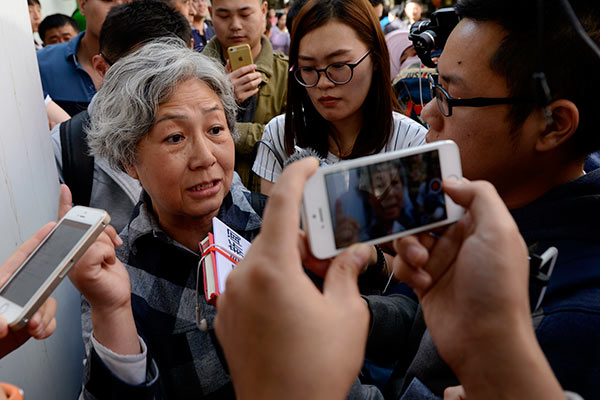 |
|
A woman identified only as Lu tells reporters at the Second Hospital of the Beijing Armed Police Corps in Beijing on Tuesday she is seeking are fund for therapy received by her husband, who had liver cancer and died in March last year. [Wei Xiaohao/China Daily] |
China's top health authority reiterated on Thursday that the clinical use of immunotherapy for cancer treatment and public hospitals' subcontracting of departments to private entities are banned.
The statement from the National Health and Family Planning Commission came amid a public outcry after the death of a young man who had received such treatment at a military hospital in Beijing.
The hospital was found to have outsourced its cancer treatment to a for-profit private company, whose medical treatment was challenged by the patient, 21-year-old Wei Zexi, as ineffective in an online post before his death on April 12.
The commission said immunotherapy "has never been approved as a formal therapeutic tool for treatment in China," meaning that such treatment can be practiced in China only for scientific research and not for commercial clinical use.
The statement reiterated that assessment and approval from the health authority are required to conduct such research, according to a regulation issued last year on "third-category medical technologies" — those deemed experimental, uncertain or risky.
Patients who participate in such research should be fully informed, and the treatment must be free of charge, the regulation says.
Immunotherapy, which boosts patients' own immune system to fight cancer, includes many types, including the one known as DC-CIK, which the young man had undergone. His parents said they had spent more than 200,000 yuan ($31,000) at the Second Hospital of Beijing Armed Police Corps for the treatment.
A source close to the situation told China Daily that, despite the government bans, some public hospitals have also charged for providing immunotherapy.
The commission reiterated that the regulation "must be strictly enforced to better secure public health".
It also reiterated that public hospitals are prohibited from subcontracting departments to private practitioners or publishing illegal or misleading medical advertisements. Hospitals at all levels are required to conduct self-examinations and report any such practices.
However, because military hospitals are not under the jurisdiction of government health authorities in China, orders from the commission serve only as a reference.
The health bureaus of the Central Military Commission and the national Armed Police Force, which oversee military-affiliated hospitals, are jointly probing the hospital involved, but no results have been announced.
Wei, who suffered from terminal synovial sarcoma, a rare form of cancer of the soft tissue, said in his online post that he learned of the hospital while researching his disease on Baidu, China's dominant search engine, which promotes paid contents without providing clear disclaimers.
Nasdaq-listed Baidu's paid listing service is now being investigated by China's internet regulators.
In his posting, Wei said a doctor at the hospital told him that the treatment was done in collaboration with Stanford University in the United States and used "cutting-edge technology" and could prolong his life for 10 to 20 years.
The hospital has declined to comment on the case.
On Wednesday, Stanford denied any relation with the hospital or the case. Jana Chow, manager for media relations at Stanford Health Care, did not respond to China Daily's inquiries regarding its research or clinical use of immunotherapy, or DC-CIK treatment specifically.
The hospital suspended operations on Wednesday. Beijing Youth Daily reported on Thursday that the hospital had begun to offer refunds to some patients who have been receiving cancer treatment there, but that requests from patients for their medical records were rejected.
Medical experts are concerned that the latest case could be a heavy blow to the country's immunotherapy research.
Guo Jun, deputy director of Peking University Cancer Hospital, said immunotherapy is internationally recognized as a future direction of cancer treatment, particularly for melanoma, kidney and lymph cancers.
Guo added that DC-CIK, which Wei received, is only one type of immunotherapy and that "it's not scientific or rational to denounce and abandon the emerging therapy as a whole".
